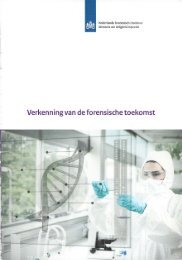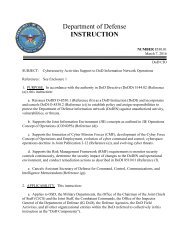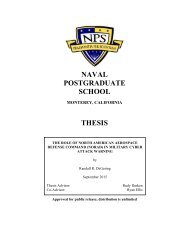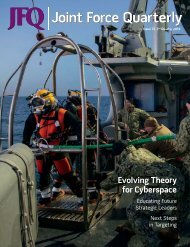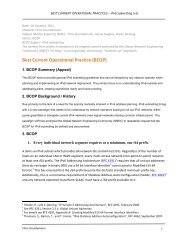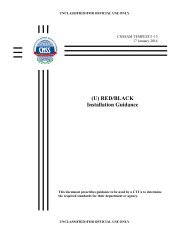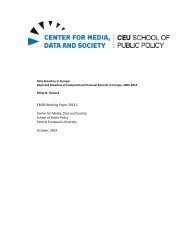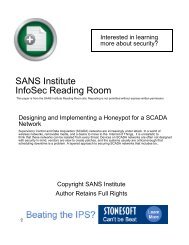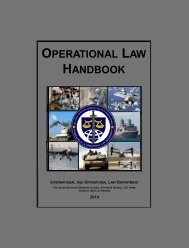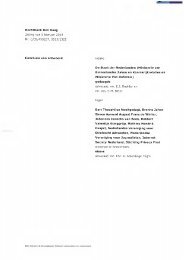jko-catalog-sep-2012
jko-catalog-sep-2012
jko-catalog-sep-2012
You also want an ePaper? Increase the reach of your titles
YUMPU automatically turns print PDFs into web optimized ePapers that Google loves.
JKO Course Descriptions<br />
actively involved in the operational planning process. This lesson focuses on the responsibilities of both the combatant command<br />
and the JTF in the planning and forming of the Joint Task Force organization. The primary joint publication for this lesson<br />
is Joint Pub 3-33, "Joint Task Force Headquarters." 2 hour(s)<br />
APC 08: Lifecycle of the JTF – Deploy and Redeploy AFR-AFDL-010812* N,S, IP<br />
The purpose of this course is to examine the two movement phases of the lifecycle of the Joint Task Force; deploying and redeploying.<br />
It focuses on the responsibilities of both the combatant command and the JTF during these two phases. It also explores<br />
how the combatant command and JTF execute the deploy and redeploy phases in the lifecycle of the JTF in support of<br />
theater operations. The primary reference publication for this lesson is Joint Pub 3-33, "Joint Task Force Headquarters." 2<br />
hour(s)<br />
APC 09: Lifecycle of the JTF – Employ AFR-AFDL-010912* N,S, IP<br />
The purpose of this course is to examine the central phase of the lifecycle of the Joint Task Force; employment. It focuses on<br />
the responsibilities of the combatant command and JTF during the employment phase. It also explores how the combatant<br />
command and JTF executes the employment phase of the lifecycle of the JTF to support theater operations. The primary publication<br />
reference for this lesson is Joint pub 3-33, "Joint Task Force Headquarters." 2 hour(s)<br />
APC 10: Lifecycle of the JTF – Transition AFR-AFDL-011012* N,S, IP<br />
The purpose of this course is to examine what is arguably the most challenging phase of the lifecycle of the Joint Task Force;<br />
transition. It focuses on the responsibilities of both the combatant command and JTF. It also explores how the combatant<br />
command and JTF execute the transition phase of the lifecycle of the JTF in support of theater operations. In the context of<br />
this lesson "transition" refers to the transitional period between employment of a force and its' redeployment. It may be a distinct<br />
phase unto itself, or embedded as an activity within another phase. The primary publication reference is Joint Pub 3-33,<br />
"Joint Task Force Headquarters." 2 hour(s)<br />
APC 11: Situational Awareness - Overview AFR-AFDL-011112* N,S, IP<br />
The purpose of this course is to provide an overview of situational awareness. It provides both definitions and concepts related<br />
to situational awareness. Situational awareness informs the decision making process; understanding the context of situational<br />
awareness and how it aids the combatant commander in operations planning is key to understanding actions taken in<br />
an operation to gain or achieve the desired objectives. This lesson also serves as a prelude to the follow-on situational awareness<br />
lessons covering organizations, processes, and systems. 1 hour(s)<br />
APC 12: Situational Awareness - Organizations AFR-AFDL-011212* N,S, IP<br />
The purpose of this course is to examine the staff organizations required for building and maintaining situational awareness<br />
within a Joint Force Command. It addresses two broad categories: elements of the cross-functional staff that contribute to situational<br />
awareness by virtue of how they elevate data and information to the cognitive levels required for situational understanding,<br />
and elements employed within the staff structure with specific information and knowledge management functions.<br />
1 hour(s)<br />
APC 13: Situational Awareness - Processes AFR-AFDL-011312* N,S, IP<br />
The purpose of this course is to examine the processes and procedures required for building and maintaining situational<br />
awareness within an organization. It focuses on several critical components of any information or knowledge management<br />
process; establishing an information management process or plan; managing information requirements through CCIR establishment<br />
and maintenance; sequencing product development through the "Battle Rhythm"; and creating a common visual representation<br />
for the command through a Common Operational Picture, or COP. 2 hour(s)<br />
APC 14: Situational Awareness - Systems AFR-AFDL-011412* N,S, IP<br />
The purpose of this course is to examine the systems required for building and maintaining situational awareness within a joint<br />
force. It addresses the larger issues and challenges attendant to creating a system architecture comprehensive enough to<br />
enable basic communication, collaboration and the visual representation of knowledge, thereby supporting an environment<br />
conducive to situational awareness and situational understanding. 1 hour(s)<br />
Applied Radiological Response Techniques (ARRT) Course J3OP-US251 N,S<br />
The purpose of this course is to provide a solid and practical foundation for first responders to address radiological incidents<br />
including all DoD and other federal, state, or local personnel engaged in technical orientation for ARRT. This is a newly developed<br />
course that has not yet been taught in any online format. At the completion of this course, the student will: have a working<br />
technical knowledge of the basic principles of science and radioactivity applied to first responder operations; be able to<br />
apply radiation units of measure to radiation protection and response scenarios; identify the ways in which radiation interacts<br />
with matter; apply skills to use gas-filled and solid state radiation detectors; define regulatory controls concerning radiological<br />
* Indicates new courses added to the JKO LCMS after July 2011. The “*” is not a part of the actual course number.<br />
66



